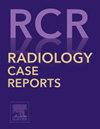Severe contrast-induced encephalopathy diagnosed with postmortem dual-energy CT in an elderly patient
Q4 Medicine
引用次数: 0
Abstract
Contrast-induced encephalopathy (CIE) is a rare complication associated with the use of iodine-based contrast agents and can be severe in some cases. In such cases, symptoms of encephalopathy, seizures, and neurological deficits appear shortly after contrast administration. This case report discusses a 90-year-old woman who developed severe CIE after iodine contrast agent administration. The patient underwent contrast enhanced computed tomography (CT) and left lower extremity angioplasty 2 days later. The patient's level of consciousness decreased the day after angioplasty; CT and magnetic resonance imaging (MRI) scans suggested CIE. Although the patient was treated with dialysis, but passed away 2 days after onset. Head CT at the time of onset showed extensive high-density area in the cerebral sulci. However, the distribution was different from typical subarachnoid hemorrhage due to ruptured aneurysm; subsequent MRI showed no evidence of subarachnoid hemorrhage. Therefore, CIE was suspected, rather than hemorrhage. A head dual-energy (DE)-CT, which can non-invasively assess the presence of intracranial iodine, was planned for diagnosing CIE. Although her poor condition made it difficult to performed prior to the death, so postmortem DE-CT was performed and confirmed the presence of iodine intracranially. This case suggests considering CIE in patients who develop impaired consciousness after contrast agents use, even when the contrast agents are not directly injected into cerebral blood vessels. In suspected CIE cases, DE-CT is useful for distinguishing iodine from hemorrhage.
求助全文
约1分钟内获得全文
求助全文
来源期刊

Radiology Case Reports
Medicine-Radiology, Nuclear Medicine and Imaging
CiteScore
1.10
自引率
0.00%
发文量
1074
审稿时长
30 days
期刊介绍:
The content of this journal is exclusively case reports that feature diagnostic imaging. Categories in which case reports can be placed include the musculoskeletal system, spine, central nervous system, head and neck, cardiovascular, chest, gastrointestinal, genitourinary, multisystem, pediatric, emergency, women''s imaging, oncologic, normal variants, medical devices, foreign bodies, interventional radiology, nuclear medicine, molecular imaging, ultrasonography, imaging artifacts, forensic, anthropological, and medical-legal. Articles must be well-documented and include a review of the appropriate literature.
 求助内容:
求助内容: 应助结果提醒方式:
应助结果提醒方式:


